“I really felt like [the newsroom was] in a ton of stress while we were doing this. They still are.”
– Angie Newsome | WNC LINC Project Manager
The Asheville Citizen-Times (AC-T) got off to a strong start on building tools and recruiting partners for a network of news sites in the Blue Ridge Mountains region of Western North Carolina.
But no sooner did the original project managers leave with the end of their first-year contracts than the project tanked – amid significant upheaval in this Gannett newsroom.
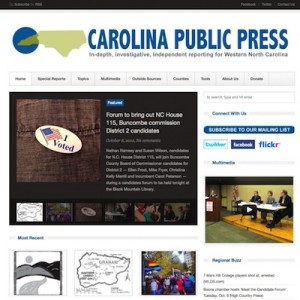 We note, with considerable irony, that one of those managers, Angie Newsome, soon launched her own statewide public-policy reporting site, Carolina Public Press. It has hatched partnerships with several other news outlets in the state, including the Charlotte Observer. “When we started . . . I contacted the AC-T several times, but got no response,” she said. “I thought it was a no brainer.”
We note, with considerable irony, that one of those managers, Angie Newsome, soon launched her own statewide public-policy reporting site, Carolina Public Press. It has hatched partnerships with several other news outlets in the state, including the Charlotte Observer. “When we started . . . I contacted the AC-T several times, but got no response,” she said. “I thought it was a no brainer.”
Despite initial high energy, Asheville’s story is one of momentum lost, high-touch coordination disappearing, an odd assortment of partners, and a yawning newsroom-leadership vacuum.
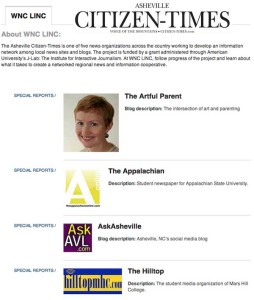 In late 2009, Newsome and co-manager Lydia Carrington, both former AC-T staffers, were hired as contractors to manage the project. They quickly branded the initiative WNC LINC, the Western North Carolina Local Information Cooperative and started a project blog. They also developed a widget for partners to use on their websites and AC-T’s home page. It featured RSS feeds of the top headlines and paragraphs of partner stories and was designed to drive traffic to partner sites. All of Asheville’s Net-J partners managed to get the widget or a widget button working on their sites.
In late 2009, Newsome and co-manager Lydia Carrington, both former AC-T staffers, were hired as contractors to manage the project. They quickly branded the initiative WNC LINC, the Western North Carolina Local Information Cooperative and started a project blog. They also developed a widget for partners to use on their websites and AC-T’s home page. It featured RSS feeds of the top headlines and paragraphs of partner stories and was designed to drive traffic to partner sites. All of Asheville’s Net-J partners managed to get the widget or a widget button working on their sites.
Most hurtful, the Gannett newsroom was without a top editor for fully a year after Executive Editor Phil Fernandez, who had initiated the project, left in November 2010 to become editor for the Bristol Herald Courier, a Media General paper in Bristol, Va.
A landing page was added to the AC-T website and a project link was added to the home page’s navigation bar. For a while the project had a news feed near the bottom of the home page. The project never did add live news feeds to the landing page. While the widgets have largely disappeared, partners still occasionally share content via a Twitter account.
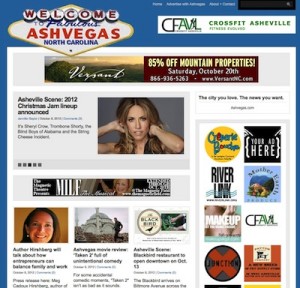 Recruiting partners turned out to be difficult. Two of the most logical prospects declined to participate. In the case of the lively AshVegas, founder Jason Sandford was working at the time for the AC-T’s chief competitor.
Recruiting partners turned out to be difficult. Two of the most logical prospects declined to participate. In the case of the lively AshVegas, founder Jason Sandford was working at the time for the AC-T’s chief competitor.
Moreover there was skepticism about whether the newspaper really just wanted free content and possible control of the partner sites, Newsome said.
The first partners were AskAsheville.com, a local news site; Montford.org, a website for the historic Montford neighborhood; The Artful Parent, a parent and art blog; and the Southern Highland Reader, a news and opinion site later spun into the Tuckasegee Reader that was published at www.tuckreader.com.
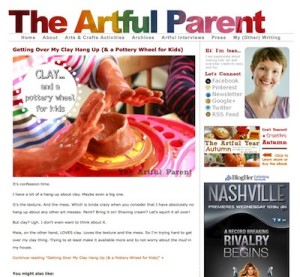 The Artful Parent was robust enough that its founder Jean Van’t Hul was later recruited to write a column for the paper’s parenting magazine. She was a willing but head-scratching partner. “I naturally find (and take advantage of) opportunities for collaboration with other parenting/art blogs, but am having trouble seeing such opportunities with WNC LINC that seem appropriate for the topic and feel of my blog,” she offered in a first-year evaluation.
The Artful Parent was robust enough that its founder Jean Van’t Hul was later recruited to write a column for the paper’s parenting magazine. She was a willing but head-scratching partner. “I naturally find (and take advantage of) opportunities for collaboration with other parenting/art blogs, but am having trouble seeing such opportunities with WNC LINC that seem appropriate for the topic and feel of my blog,” she offered in a first-year evaluation.
Montford.org ended up sharing an important crime story on a brutal neighborhood mugging that the newsroom found invaluable. TuckReader.com halted publication last year after one of its editors, Giles Morris, was hired to be editor of C-ville.com in Charlottesville, Va.
Four college/university sites were also recruited to be in the network. The Hilltop, the student newspaper of Mars College; The Blue Banner of the University of North Carolina-Asheville; The Appalachian Online, from Appalachian State University; and Western Carolina University, which was planning to develop a student news site. Two more university sites were added later.
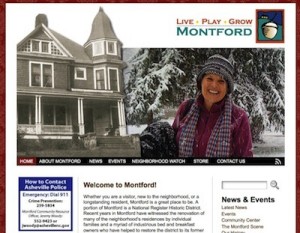 By the start of the second year, the project had eight partners, of which four were affiliated with colleges or universities. WNC LINC soon found that the university sites were dormant when the schools were not in session, and the changing cast of editors made coordination challenging.
By the start of the second year, the project had eight partners, of which four were affiliated with colleges or universities. WNC LINC soon found that the university sites were dormant when the schools were not in session, and the changing cast of editors made coordination challenging.
While the project had sought partner sites that posted frequent, original news content, “by necessity we had to broaden our pool of partners,” Newsome said. Requirements became looser and the focus was more on potential rather than past performance.
The project developed a Memorandum of Understanding and a content-sharing agreement that codified expectations and guidelines of sharing and attributing content.
The stipends paid to the initial partners “went a long way in building trust in the community and countering claims that the newspaper simply wanted content for free,” Newsome said. Moreover, the funds helped all the partners to either launch or improve their sites.
Newsome reported that she tried to connect the partners to key editors in the AC-T newsroom, inviting them to a morning news budget meeting, and training the paper’s online department on how to share partner content. However, layoffs creamed the newsroom, editors were not fully engaged, and partners were reporting minimal increases in traffic.
“The Citizen Times is responsible to make sure traffic comes to the WNC LINC,” Ask Asheville founder Gary Charles reported after the first year. ‘This is not working properly. “
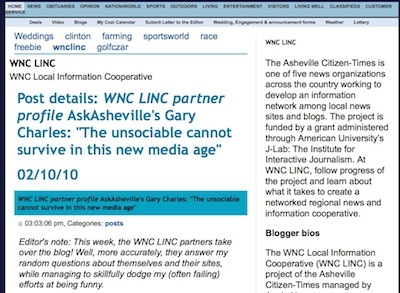
Most hurtful, the Gannett newsroom was without a top editor for fully a year after Executive Editor Phil Fernandez, who had initiated the project, left in November 2010 to become editor for the Bristol Herald Courier, a Media General paper in Bristol, Va.
It wasn’t until late 2011 that Randy Hammer, the paper’s president and publisher, was charged with also leading the newsroom. Newsome, however, noted that he did make it a point early on to meet with all the Net-J partners.
The partners met with the AC-T’s advertising staff to discuss ideas for generating and sharing revenue. One idea was to build an advertising widget similar to the content widget. At the partners’ request, an advertising training session was held in June 2010 to help the sites identify potential advertisers, pitch ads and set rates. They were also trained in the use of social media.
By September 2010, the project was added to the portfolio of Jason Sandford, the AshVegas founder who had returned to the AC-T as a columnist and reporter. Sandford was thought to be the “perfect person” to shepherd the partnership, Hammer said.
However, Sandford was also focused on a separate partnership between AshVegas and the newspaper. “My site is not an official WNC LINC partner, but it certainly could be,” he said, although he expressed some discomfort with a role as both project partner and project coordinator.
Sandford said he tried to “re-energize” the project and had plans to build out WNC LINC Facebook and YouTube pages, but internal support was lacking. Early discussions about monetizing the collaboration were met with disagreement among partners “about what kinds of ads they would allow on their site.”
In August 2011, Tuck Reader’s Morris complained to J-Lab that, even though his site was listed on the AC-T website as a WNC LINC participant, he could elicit no response from the paper.
“We had better luck with Mountain Xpress and North Carolina Public Press in terms of content sharing in a meaningful way,” he said.
By December 2011, Hammer acknowledged the partnership was inactive, although he said he had aspirations to revive it. The landing page still exists.
Newsome said she thinks it would have been better if the project had been managed inside the newsroom so there could be face-to-face contact with newsroom leaders, better communication and more effort to get shared content online and into print.
“I really felt like [the newsroom was] in a ton of stress while we were doing this,” Newsome said. “They still are.”






